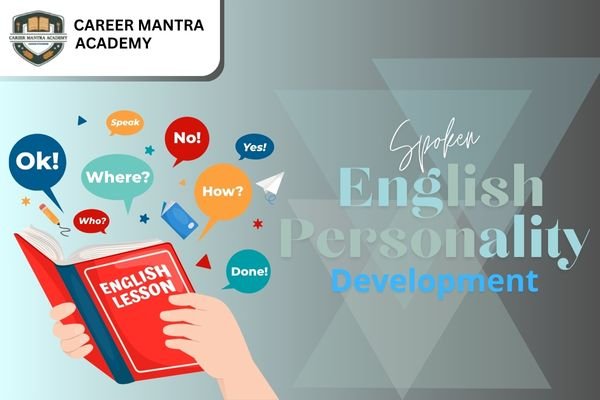What Is Spoken English Personality Development and Why Is It Important?
The process of improving your English communication abilities while gaining self-assurance, clarity, and a positive self-image is known as spoken English personality development. Learning vocabulary and grammar is only one aspect of it; other aspects include developing body language, making an impression, and communicating ideas clearly.
Importance of Spoken English Personality Development:
- Boosts Confidence: Fluency in English helps you speak without hesitation in public, interviews, or meetings.
- Professional Growth: Most global companies value employees who can communicate effectively in English.
- Better Social Interaction: Strong English skills allow you to connect with diverse groups of people.
- Positive Personality Impact: Clear communication adds charm and authority to your personality.
- Opens Opportunities: From education to career, spoken English creates global opportunities.
In today’s world, mastering spoken English is essential for shaping personality and achieving personal as well as professional success.

For Applying Spoken English Course Click Here…
How Can Career Mantra Academy Improve Your Personality with a Course in Spoken English?
Career Mantra Academy has a spoken English personality development program that goes beyond grammar and is broken down into steps. It is all about building confidence, improving communication skills, and growing professionally. The goal of each part of the course is to help students get over their fear, become more fluent, and build their confidence. When students learn these steps, they get the skills they need for interviews, presentations, and social interactions. This makes them stand out in both their personal and professional lives.
These are the Steps to Personality Development through Spoken English at Career Mantra Academy:
STEP 1. Basic :
The foundation stage includes common greetings, introductions, and conversations that happen every day. Students practice speaking in short sentences, which helps them get over their shyness and gives them the confidence to start using English in their daily lives. This step is very important for beginners who want to slowly but surely become fluent.
- Practice simple daily conversations
- Build vocabulary for common use
- Gain confidence in introductions
STEP 2. Basic Grammar :
Good grammar is the most important part of good communication. At this point, students learn the basics of tenses, sentence structures, and how to use words correctly. It not only gets rid of common mistakes, but it also makes things clearer, which makes communication more professional and effective.
- Learn basic tenses and structures
- Avoid frequent errors in speech
- Speak clearly with accuracy
STEP 3. Telephonic Conversation :
Talking on the phone is often harder than talking to someone in person. This step teaches students how to speak clearly, use polite language, and be confident on the phone. It gets them ready for interviews, talking to customers, and business meetings.
- Improve voice clarity
- Handle business or customer calls
- Develop polite, professional responses
STEP 4. Translation (Hindi to English) :
Fluency is slowed down by the fact that many students think in Hindi before translating into English. By practicing translations, this step teaches them to directly form ideas in English, which aids in natural fluency, improved vocabulary usage, and prompt response.
- Practice translating daily sentences
- Build quick thinking in English
- Strengthen fluency without hesitation
STEP 5. Grammar :
To improve communication skills, advanced grammar lessons are introduced. Students work on error correction, complex sentences, and connectors. Accuracy is essential in formal communication, such as business emails, reports, and presentations, where this deeper understanding is helpful.
- Learn advanced grammar usage
- Develop formal communication skills
- Improve sentence construction
STEP 6. Writing Skills :
Writing shows who you are just as much as talking does. At this point, students write essays, applications, business emails, and reports. The emphasis is on clarity, structure, and word choice, which improve academic performance and communication at work.
- Write error-free applications and emails
- Practice formal and informal writing
- Build structured and clear sentences
STEP 7. Public Speaking :
Fear of the stage is one of the biggest things that stops people from growing as people. Students can practice giving speeches, debating, and telling stories in public speaking sessions. They learn how to change their voice, be confident, and connect with an audience, which makes them better leaders.
- Improve stage confidence
- Learn voice modulation techniques
- Engage the audience effectively
STEP 8. Group Discussion :
This step is all about working together and thinking critically. Students talk about current events, share their thoughts, and learn how to listen and respond well. It helps people learn how to make decisions, think quickly, and talk to each other in a polite way.
- Enhance leadership skills
- Build logical and quick responses
- Improve teamwork and listening
STEP 9. Job Training :
Special modules help students get ready for work by teaching them how to write a resume, how to act in the workplace, and how to prepare for interviews. Students can do well in real-life job situations by practicing interviews and role-plays to build their confidence.
- Practice mock interviews
- Learn workplace communication
- Build confidence for real job roles
STEP 10. Presentation Skills :
Finally, students learn how to use tone, facial expressions, and body language to make their ideas clear. They practice giving presentations that make an impact with confidence, which makes them look better as professionals and leaders.
- Master effective body language
- Present ideas with clarity and confidence
- Create strong first impressions

How Does Spoken English Boost Self-Confidence?
Speaking English helps people feel more sure of themselves because it lets them say what they mean clearly and without hesitation. When students become fluent, they feel more at ease in both their personal and professional lives. This confidence shows not only in what they say, but also in how they move, how they look at people, and their whole personality. Speaking English fluently opens doors, makes you less afraid of being judged, and leaves a lasting impression on others.
ways Spoken English boosts self-confidence:
- Removes hesitation and fear of speaking in public
- Improves social interactions and networking skills
- Creates a strong professional image in the workplace
- Builds courage to participate in group discussions and presentations
- Strengthens personality by adding clarity and authority to communication
Why Is Spoken English Personality Development Crucial for Career Success?
For career success, spoken English personality development is important because it affects both communication and self-assurance. Language is more than just a way to talk in the modern workplace; it’s also a sign of professionalism and skill. People who speak fluent English can clearly express their ideas, take part in discussions, and make a good impression on coworkers and bosses. It also helps when you talk to clients, give presentations, and go to job interviews, where being clear and confident is the most important thing.
Professionals who can speak English well and work on their personalities can lead, work with others, and adapt to work environments around the world. This will help them grow, get promotions, and have a successful career in the long run.
How Does Spoken English Improve Social Interaction and Networking?
Spoken English improves Social Interaction by helping individuals communicate clearly and confidently in daily conversations, social gatherings, and cultural exchanges. It reduces hesitation, builds trust, and makes it easier to connect with people from different backgrounds.
It also strengthens Networking by allowing professionals to express ideas, share knowledge, and collaborate effectively. With fluent English, individuals can create lasting impressions in meetings, conferences, and online platforms, leading to better opportunities and stronger professional relationships.
How Do Vocabulary and Fluency Affect Personality Development?
Vocabulary plays a key role in personality development because the words you choose reflect your knowledge and confidence. When you have a strong vocabulary, you can express ideas more clearly, use the right words for the right situations, and create a positive impression in both personal and professional conversations.
Fluency adds to this by ensuring smooth, natural communication without hesitation. When you speak fluently, people see you as confident, capable, and approachable. Together, vocabulary and fluency shape a polished personality that stands out in interviews, discussions, and social interactions.
Does Pronunciation Impact Spoken English Personality Development?
Pronunciation has a major impact on spoken English personality development because it shapes how others understand and respond to you. Even with good grammar and vocabulary, unclear pronunciation can cause confusion and lower confidence. Clear and correct pronunciation makes speech effective, professional, and easy to follow. It builds self-assurance, improves communication in social and professional settings, and creates a lasting impression. When you pronounce words accurately, you appear more polished, confident, and approachable, which directly strengthens personality development and helps in interviews, discussions, and public speaking.

How Can You Improve Spoken English to Enhance Personality?
Improving spoken English is one of the most effective ways to enhance personality because it builds confidence, clarity, and communication skills. Regular practice through conversations, reading aloud, and listening to English content can strengthen fluency and vocabulary. Focusing on grammar, pronunciation, and sentence formation helps in speaking accurately and professionally. Participating in public speaking, group discussions, and presentations allows you to express yourself confidently in front of others. Over time, consistent practice not only improves English skills but also shapes a polished, confident, and approachable personality that leaves a positive impression in personal and professional interactions.
What Are the Real-Life Benefits of Spoken English Personality Development?
Speaking English has many useful benefits in both personal and professional settings. It boosts confidence, which helps people express their thoughts clearly and with confidence. It makes it easier to work with coworkers, clients, and superiors, which in turn makes teamwork and collaboration more effective. It helps people make friends, network, and connect with people from different backgrounds. It also provides better job opportunities, opportunities to attend college, and the chance to explore the world. In general, improving your spoken English skills not only makes it easier to talk to people but also gives you a confident, polished, and professional personality that stands out in any situation.
Conclusion.
Spoken English personality development is more than just learning a language; it’s a way to become more confident, clear, and have a strong sense of self. People can communicate well in both social and professional settings by improving their vocabulary, fluency, pronunciation, and communication skills. The benefits extend beyond language; they impact your entire personality, enhance your job prospects, and boost your self-confidence. Public speaking, regular practice, and interactive learning can all help you become more confident, friendly, and professional. Spending time on spoken English not only helps you communicate better, but it also changes who you are, leading to personal growth, professional success, and meaningful social connections.
FAQs
How to develop personality in English?
Personality development in English involves improving your communication skills while building confidence and a positive self-image. It starts with learning basic English vocabulary, grammar, and sentence formation to speak clearly and effectively. Practicing conversations, reading English content, and listening to fluent speakers help improve fluency. Participating in activities like public speaking, group discussions, and presentations enhances confidence and social skills. Additionally, focusing on body language, voice modulation, and polite expressions makes your personality more appealing. Regular practice and consistent learning not only improve English proficiency but also shape a confident, polished, and professional personality for both personal and career growth.
What is the role of the English language in personality development?
The English language plays a significant role in personality development because it is widely used for communication in education, business, and social interactions. learning and speaking English fluently helps individuals express their thoughts clearly, which boosts confidence and self-esteem. It also improves social skills by enabling effective communication with people from different backgrounds. In professional settings, strong English skills enhance career opportunities, teamwork, and leadership abilities. Overall, mastering English not only strengthens communication but also shapes a confident, polished, and professional personality, making it easier to succeed in personal, academic, and professional life.
What are the 5 points of personal development?
Personal development focuses on improving oneself in various aspects of life. Here are five key points:
1. Self-awareness: understanding your strengths, weaknesses, values, and emotions to make better decisions.
2. Communication skills: developing the ability to express thoughts clearly and listen effectively.
3. Confidence and self-esteem: building belief in your abilities and maintaining a positive mindset.
4. Time management and goal setting: planning and prioritizing tasks to achieve personal and professional objectives.
5. Continuous learning: acquiring new skills, knowledge, and experiences to grow personally and professionally.
What are the components of personality in English?
The components of personality include various traits and characteristics that define how a person thinks, feels, and behaves. Some key components are:
1. Physical appearance: how you present yourself, including grooming and body language.
2. Attitude: your mindset, positivity, and approach toward life and others.
3. Communication skills: the ability to speak, listen, and express ideas effectively.
4. Emotional stability: managing emotions, stress, and reactions in different situations.
5. Values and ethics: beliefs, honesty, and moral principles that guide behavior.
6. Social skills: ability to interact, build relationships, and work in teams.
What is personality in English grammar?
In English grammar, “personality” refers to the characteristics, traits, and qualities that define an individual’s behavior, attitude, and way of expressing themselves. It is not a grammatical term itself, but it is often discussed in English language learning to emphasize communication skills, confidence, and effective expression. Improving English grammar, vocabulary, and pronunciation helps a person present their personality clearly, making conversations, presentations, and social interactions more confident, polished, and impactful in both personal and professional life.
What is the most important thing in spoken English?
The most important thing in spoken English is clarity and confidence. It’s not just about using correct grammar or advanced vocabulary, but about expressing your ideas in a way that others can easily understand. Clear pronunciation, proper sentence formation, and fluency help in making conversations smooth and effective. Confidence plays a key role because it allows you to speak without hesitation, engage in discussions, and leave a positive impression in social and professional settings.
Why is the English language important in personality development?
The English language is important in personality development because it enhances communication skills, which are essential for building confidence and a positive self-image. Speaking English fluently allows individuals to express their thoughts clearly, interact effectively with others, and participate confidently in social and professional situations. It also improves vocabulary, fluency, and pronunciation, which contribute to a polished personality. Moreover, strong English skills open up career opportunities, leadership roles, and global connections, making it a key factor in personal growth and overall personality development.
How does English help us to develop our confidence and personality?
English helps develop confidence and personality by enabling clear and effective communication. When you speak English fluently, you can express your thoughts without hesitation, which builds self-assurance in social and professional situations. learning english also improves vocabulary, grammar, and pronunciation, allowing you to communicate more precisely and leave a positive impression. Participating in conversations, public speaking, and group discussions in English enhances interpersonal skills, leadership qualities, and overall presence. Over time, these skills strengthen your personality, making you confident, articulate, and capable in both personal and professional life.
How do you build your confidence when you speak English?
Building confidence in speaking English requires consistent practice and a positive mindset. Start by learning basic vocabulary and sentence structures, and gradually practice speaking in front of a mirror or with friends. Listening to fluent speakers, reading aloud, and engaging in conversations help improve pronunciation and fluency. Participating in public speaking, group discussions, and role-playing scenarios also boosts self-assurance. It’s important to embrace mistakes as learning opportunities and stay patient with your progress. Over time, regular practice and exposure to English communication make you more confident, fluent, and comfortable expressing your thoughts.
How to train your brain to speak English confidently?
Training your brain to speak English confidently requires consistent practice and mental preparation. Start by thinking in English instead of translating from your native language, which helps your mind respond quickly. Practice speaking daily, even in small conversations, and listen to fluent speakers to internalize pronunciation, tone, and sentence structures. Reading, writing, and repeating sentences aloud strengthens language retention. Visualization techniques, like imagining yourself speaking confidently in real situations, also help. Over time, these habits train your brain to process English naturally, reduce hesitation, and allow you to speak with confidence in both social and professional settings.
